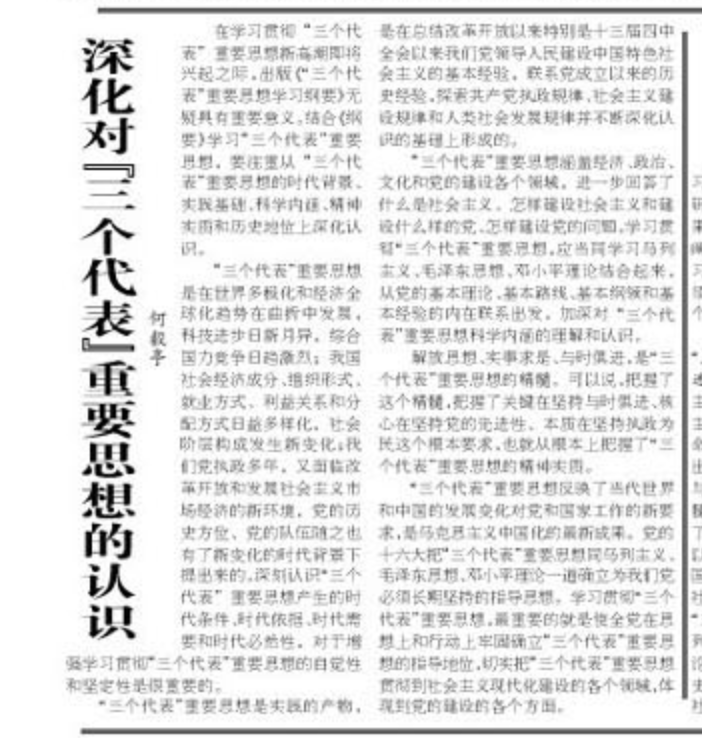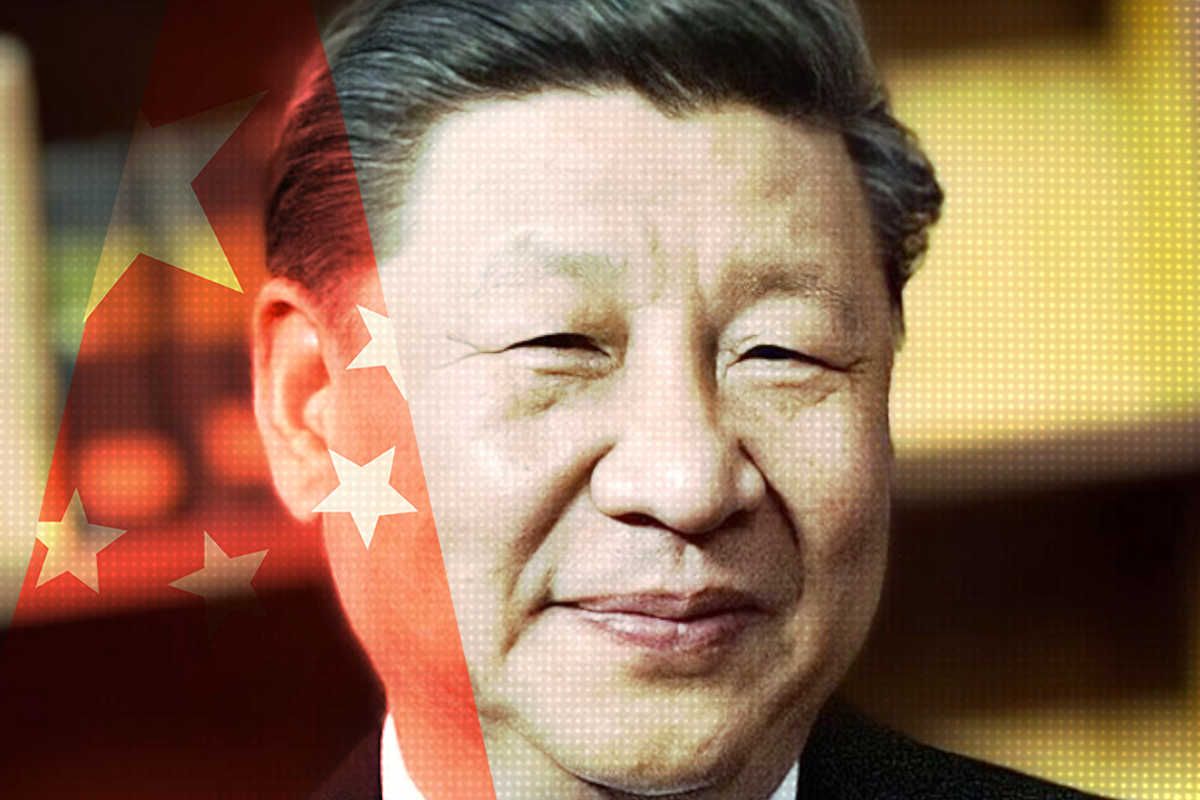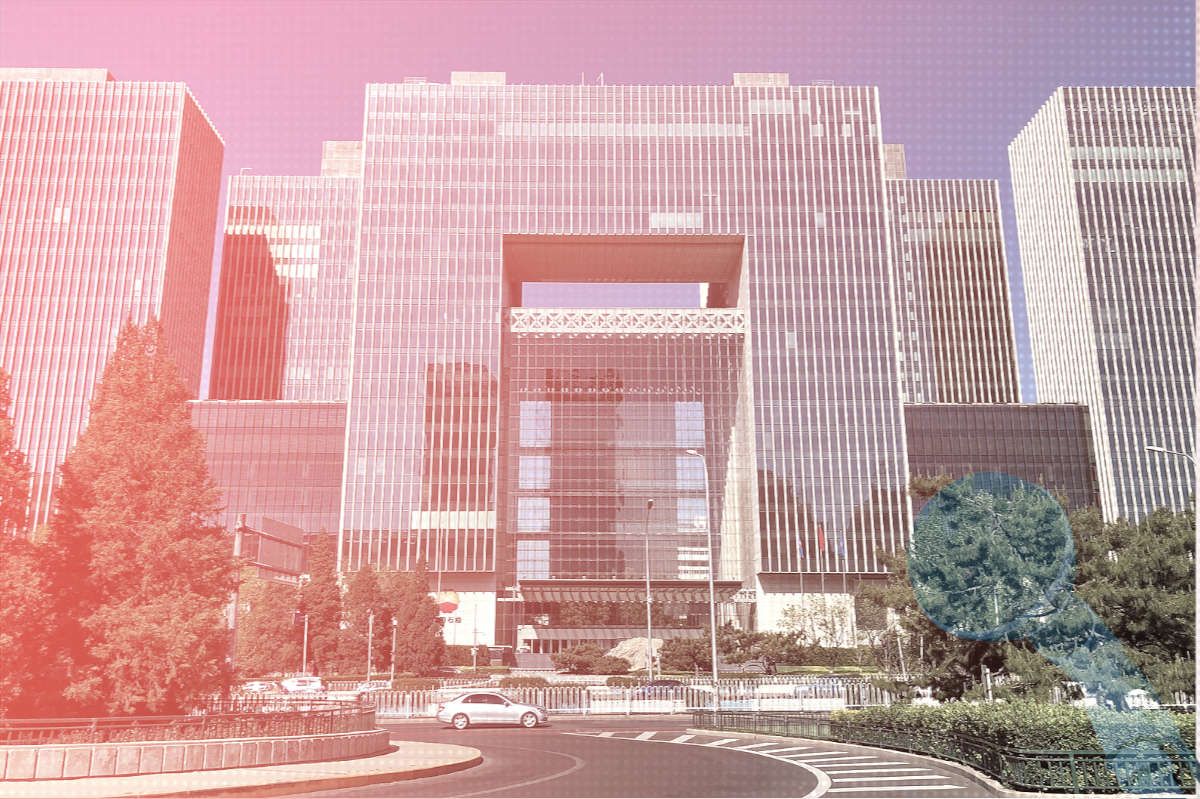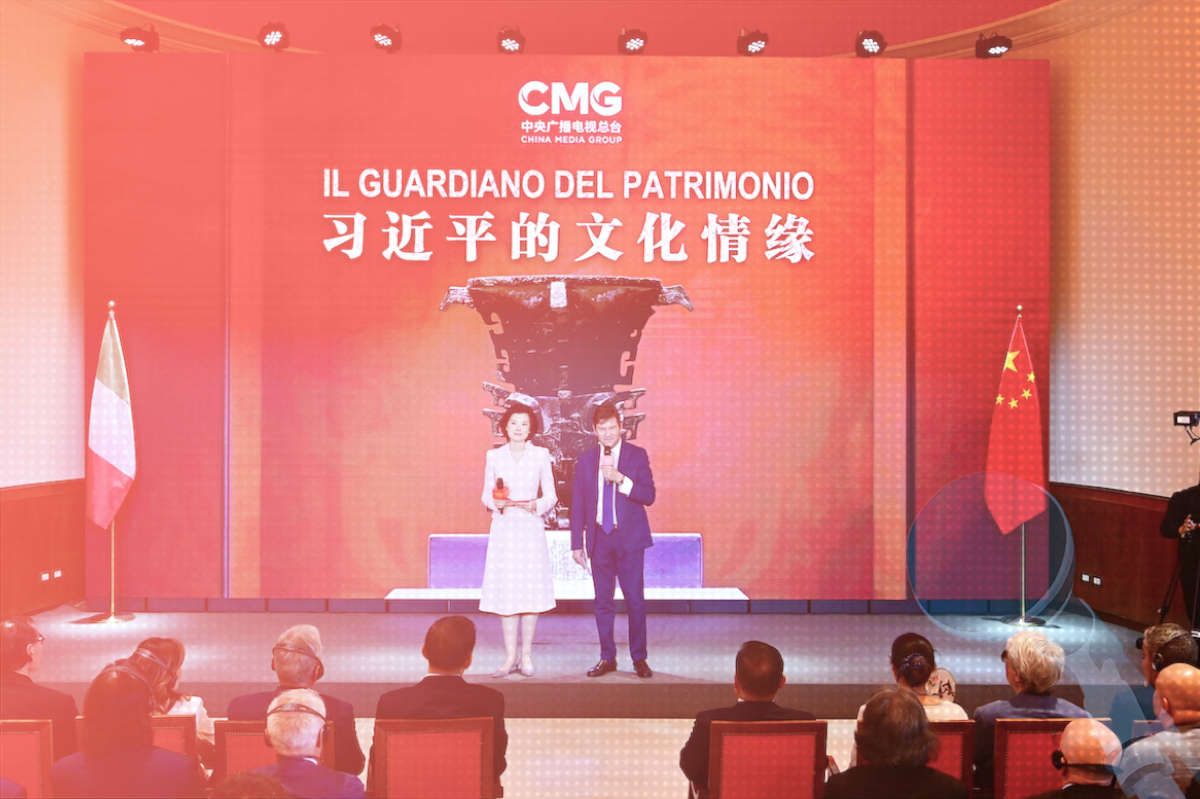China Newspeak
Claiming 21st Century Marxism
Several years ago, the Monthly Review, an independent socialist magazine published in New York since 1949, ran an essay by economist Michael A. Lebowitz of Simon Fraser University that asked: “What is Socialism for the Twenty-First Century?” The essay began with a litany on what socialism for the twenty-first century is not.
First and foremost, wrote Lebowitz, twenty-first century socialism “is not capitalism,” or what he describes as a society of “increasing exploitation,” where “the owners of the means of production benefit by dividing workers and communities in order to drive down wages and intensify work.” Second, twenty-first century socialism is not “a statist society where decisions are top-down and where all initiative is the property of state office-holders or cadres of self-reproducing vanguards.” Rather, says Lebowitz, twenty-first century socialism “rejects a state that stands over and above society.” Finally, Lebowitz tells us, twenty-first century socialism “is not populism,” and “is not totalitarianism.”
Nowhere in his lengthy exploration of twenty-first century socialism, written in preparation for a new program in Cuba, does Lebowitz mention China, the world’s largest “socialist” country – with all of the caveats and air quotes that label deserves. The omission is perhaps understandable when you run through the author’s list and recognize that China is home to a highly exploitative form of capitalism, one that systematically disenfranchises hundreds of millions of rural migrant workers; that China is highly statist, and that “most signs point toward further entrenchment of statism”; that the country’s top leader, Xi Jinping, has applied to himself an often sickeningly thick patina of populism; and that its politics had edged rapidly down the slippery slope toward totalitarianism, with the concentration of power around Xi and a constitutional amendment cancelling the two-term limit on the presidency.
But China can apparently leave the debate over twenty-first century socialism to Western scholars and Latin American leaders. Though we have made our way through just 20 percent of the 21st century, leading political theorists are now asserting the China has “Marxism for the 21st century” in the bag.
In a piece Monday on the front page of the Study Times, a newspaper published by the Central Party School (CPS), He Yiting (何毅亭), the school’s deputy director, declared that Xi Jinping’s banner term, “Xi Jinping Thought on Socialism with Chinese Characteristics for a New Era” (习近平新时代中国特色社会主义思想研究中心) is equal to “Marxism for the 21st century.” The claim was made directly in the headline, as readers can see from the image below.
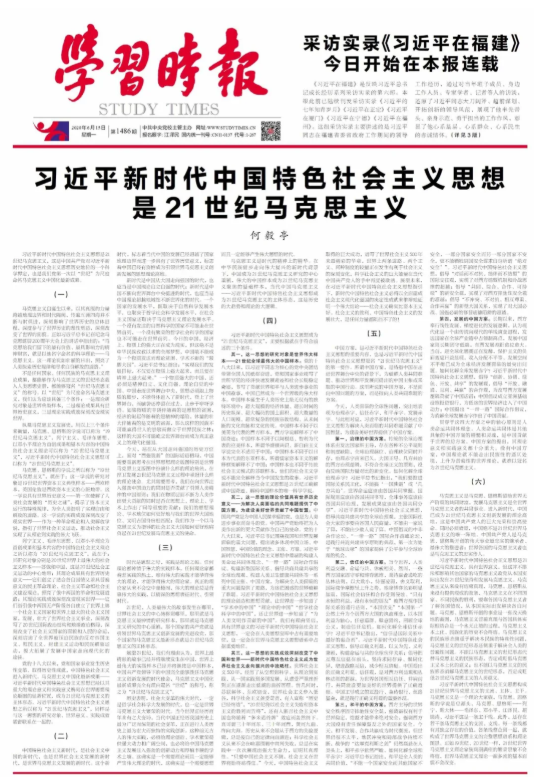
Mr. He, who is also the head of the Center for the Research of Xi Jinping Thought on Socialism with Chinese Characteristics for a New Era at the school, is one of the key theoreticians close to Xi Jinping. Cheng Li, director of the John L. Thornton China Center at the Brookings Institution, has called He Yiting perhaps the “most important individual who has contributed to the promotion of Xi’s ideological work.” Some may recall that it was He Yiting in 2017, months before the 19th National Congress, who predicted that China’s return to the global summit of “discourse power” was imminent – that the “rejuvenation of Chinese discourse” would come hand-in-hand with Xi’s “great rejuvenation of the Chinese nation.”
What is the significance of Xi Jinping’s claim to “Marxism for the 21st century”? In and of itself, the claim is not greatly significant. However, this can certainly be seen as another brick in the foundation of the Xi Jinping personality cult. In recent weeks, as the crisis of the Covid-19 epidemic has faded in China, there has been an uptick in aggrandizing discourse about Xi, as CMP noted earlier this month. The finish line in the marathon of discourse generation that has unfolded since Xi was declared the “core” in 2016 would be the final abridging of his banner term as “Xi Jinping Thought,” drawing him even with Mao Zedong.
Noting that June 15 was also Xi’s birthday, there was speculation by some that the Study Times commentary might have been a way of “shining Xi Jinping’s shoes with Marx, giving him a ‘subtle’ ‘birthday gift.'” While this is a temptingly humorous reading, grandiose gestures like this most recent one from He Yiting might better be understood as a way of testing the waters. How far can those around the “core” go in shoring up his charismatic power?
In fact, this is not the first time Xi Jinping has been credited with this claim to “Marxism for the 21st century.” More than two years ago, in January 2018, as Xi was enjoying a rapid ascent to the heights of charismatic power in the wake of the 19th National Congress of the CCP, party-state media noted that a recent “democratic life meeting” of the central leadership had “clearly raised” the fact that: “Xi Jinping Thought on Socialism with Chinese Characteristics for the New Era is the latest theoretical innovation of our Party, is Marxism for contemporary China, and is Marxism for the 21st century.” Another commentary that year from the official journal Seeking Truth said that Xi’s banner term is “the most concentrated, richest and most realistic embodiment of 21st century Marxism.”
Here is a quick look at what He Yiting’s most recent commentary in the Study Times actually says. The commentary starts by emphasizing a passage further down in the piece, arguing that the designation of Xi’s banner term as “Marxism for the 21st century” is a “scientific” determination made by the CCP, and that it is also historic:
Xi Jinping Thought on Socialism with Chinese Characteristics for the New Era is Marxism for the 21st century. This is a scientific designation of Xi Jinping Thought on Socialism with Chinese Characteristics for the New Era rendered by the Chinese Communist Party, and also the first time our Party has used “century” as a measure of the results of the sinicization of Marxism.
The reference to “crowning” in a subsequent passage again supports the idea that this is fundamentally about signalling Xi’s charismatic power.
It is not results of Marxist theory in just any country, or any people that can serve as the form of Marxism for the century and be written in the history of human thought, that can be crowned “the Marxism of the century” (世纪马克思主义).
The piece then outlines three factors that are required to make such a claim to the century for Xi’s signature theory. Such claims must have “global historical significance,” they must be able to show that theories have been applied with practical results, and so on. This is all, of course, rhetorical smoke. There is no real substance to He’s claims beyond the claims themselves. The questions only exist because He is prepared to make the bold assertion with finality – that Xi’s theory is 21st century Marxism.
He Yiting’s piece is riddled with assertions about the historic nature of Xi’s theoretical contributions that amount to a staking of future claims on the past.
Since the 18th National Congress [in 2012], there have been historic changes in the work of the Party and the state, obtaining historic results, and socialism with Chinese characteristics has entered a new era. The new result in the sinicization of Marxism, Xi Jinping Thought on Socialism with Chinese Characteristics for the New Era, has already with its great theoretical and practical significance engraved for itself a prominent position on the world’s ideological and theoretical map, becoming the dominant form of 21st century Marxism.
This is all about power. Xi’s power. And yet, He Yiting also plays the magician’s game of confuting Xi’s personal power and prestige with China’s strength as a nation, as though one cannot be had without the other.
Today, as we stand in the historical position of moving from a large nation to a strong nation (大国走向强国), facing an international discourse structure in which ‘the West is strong and we are weak’ (西强我弱), China must consider anew what theoretical role we play on the map of world ideas, and particularly on the map of global Marxism, and that theoretical mission we will take on in the process of defending and developing Marxism. We must think especially, as we inject strong Chinese momentum into the world, of whether we have contributed Chinese principles that lead the human spirit.
He Yiting goes on to talk about the global importance of a “China solution” (中国方案) and “Chinese propositions” (中国主张) in “resolving common human problems” as “china moves closer to the center of the world stage.” But this is all essentially window dressing on a frame whose sole purpose is to elevate Xi’s power and position within the CCP.
Often, with such swollen claims, a broader historical context is the best anti-inflammatory. We can note that on June 12, 2003, almost exactly 17 years ago, a lengthy commentary appeared on page 9 of the People’s Daily called “A Profound Understanding of the Important Theory of the ‘Three Represents.’” It spoke in glowingly of the banner term of Jiang Zemin, the then former General Secretary of the CCP who at the time still retained his position as head of the Central Military Commission.
The important thought of the “Three Represents” reflects the new requirements of the present-day world and China’s development, and it is the latest achievement in the sinicization of Marxism. The 16th National Congress established the status of the important thought of the “Three Represents” alongside Marxism-Leninism, Mao Zedong Thought and Deng Xiaoping Theory as the guiding ideologies that our Party must adhere to over the long term.
The commentary was written by the very same He Yiting, then serving in the Office of Policy Research. Even when it comes to core ideologies, all love affairs must end.
